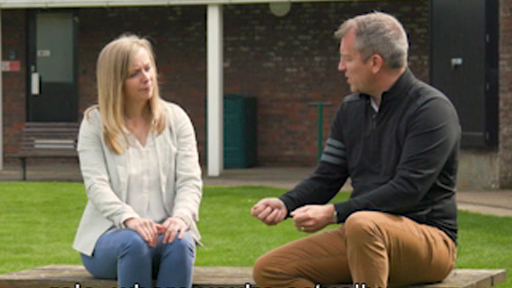3 Experiences of using questioning practices
Questioning should help to create a dialogue – it should be conversational, but it is a skill just like many other interpersonal practices.
In the following activity you will discover further nuances that may help you ask better questions.
Activity 3 Lucy Moore and Stuart Armstrong discuss their experiences
Listen to Audio 2. In this audio Lucy Moore and Stuart Armstrong reflect on their own experiences to discuss the balance between persistence in asking questions in order to raise a coach’s awareness and being more direct in proposing or suggesting something. They call this more direct approach ‘tell’ questions. What advice do they suggest in using ‘tell’ questions and when might it be appropriate to use this question type?
Transcript: Audio 2
[LAUGHTER]
Discussion
Lucy reveals that she thinks she ought to use ‘tell’ questions more often while Stuart suggests he is trying to move away from his tendency to ‘tell’ in coach learning and development. This is largely based on their different personalities. They both suggest ‘tell’ can be used as a direct question such as ‘have you thought of using ….’ and that they only use it when it is obvious that a person has limited self-awareness and a protracted questioning approach is drifting without focus. They describe it as inviting someone to consider an idea. Being candid and giving facts that a coach may not be able to see (e.g. the proportion of time a coach talks in a session) is another way of using ‘tell’. This can generate a meaningful conversation rather than ‘a questioning pantomime’ of a respondent trying to guess the answer that someone is looking for. A final tip that emerged from Lucy’s story of a her telling a coach to try something different in their half time team talk was her reflection that she had not adequately explained why trying something new might be useful to the coach and their participants.
You have head here how even two experienced coach developers are constantly reflecting on their own questioning practices and working towards improving their approach. Questioning is also an area that is researched. Cope et al.’s (2016) interesting conversational analysis in coaching suggests, amongst other findings, that when using questions you need to allow enough time for people to think and not being afraid of silence. This research is summarised more fully in an article by Oakley and Twitchen (2019): ‘How to ask better questions in developing others’ [Tip: hold Ctrl and click a link to open it in a new tab. (Hide tip)] .
So far, the types of question you have focused on have addressed what coaches do. But there are also deeper questions and conversations to be had that start to explore the beliefs and values that coaches hold.

